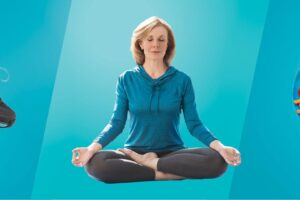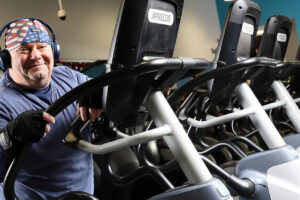The spine is like the Interstate 95 of our bodies.
All of our sensations, motor skills and coordination travel through nerves in the spinal column. When those nerve connections are disrupted by injuries or wear and tear to the spine, it can cascade into a whole series of health problems as we get older.
Poor spine health limits your ability to exercise, which is necessary to help prevent osteoporosis — the weakening of bones. Weak bones can lead to fractures in the spine, hips or other areas. Fractures can limit your ability to simply move around and enjoy life, bringing about cardiovascular problems and even, depression.
In fact, spine-related disorders are among the most frequently encountered health problems, with low-back pain affecting an estimated 80 percent of Americans at some point in their lives, according to the National Institutes of Health. To learn more about the disorders and the best approaches to relieve pain, visit our Spine Institute page.
It doesn’t have to be that way. There are many things we can do every day to promote better spine health and stave off these problems.
Maintaining a Skyscraper
The spine is also like a skyscraper, built with 33 blocks of interlocking bones (vertebrae), which are held together by ligaments and separated from each other by intervertebral discs. The discs act as shock absorbers between the bones.
All of these building blocks work together to protect the nerves of the spinal cord and support the body, allowing us to bend, stand up and twist. Maintaining this intricate structure starts, like all aspects of good health, with good nutrition, including:
- Hydration. Drinking plenty of fluids helps keep the joints in the spine well lubricated to function properly. Men should drink about 13 cups of fluids a day (from all sources, not just water) and women should strive for about 9 cups, according to the Institute of Medicine.
- Diet. Most people know that calcium-rich foods such a low-fat and non-fat milk, yogurt and cheese are good for bone health, but so are fish such as sardines and salmon, as well as many types of greens, including collard greens, kale and okra. On the flip side, eating too many salty foods can deprive the body of calcium and lead to bone loss.
- Supplements. The gastrointestinal system is one of the most important parts of the immune system, and a healthy gut helps prevent inflammation throughout the body, including the spine. Probiotic supplements, which are healthy live bacteria, have been shown to improve gut health. Vitamin D, a vitamin that is not naturally present in many foods, has also been shown in studies to promote better health.
The Importance of Posture
At the top of the spine rests a 10-pound “bowling ball,” otherwise known as the head. Proper posture helps us balance that weight without putting too much stress on the neck muscles. (If you’ve ever had a tension headache, you know what happens when those neck muscles are strained.)
Good posture and good ergonomics also help prevent wear and tear on the spine itself. It’s no different than keeping your car in balance — if the wheels are out of balance, they will wear down more quickly.
In a time when technological devices are seemingly everywhere, some of the biggest causes of bad posture, include:
- Smartphones. Wear a hands-free headset when you’re making phone calls as holding the phone to one ear leads to bad posture. If you’re reading a smartphone, hold it up to eye level, so you can look straight ahead, rather than looking down.
- Computers. The center of your computer screen should also be at eye level, even if you have to stack the monitor on top of books to achieve the proper height. At your desk, always try to sit up with your back straight, shoulders back and backside touching the back of your chair.
- Low technology. You can even achieve better posture reading a newspaper by putting pillows under your elbows to hold it closer to eye level. Also, try to get up and move if you find yourself sitting for long periods. When your muscles tire from sitting too long, slouching and other bad postures are more likely.
I often joke that the goal of good health is to allow us to “die young as late as possible.” A healthy spine can help ensure you live a full life, and accomplish all of the great things ahead of you.
Specialized Medical Care for the Brain and Spine Health
The Neuroscience Center of Central Jersey, one of the specialized treatment centers at CentraState Medical Center in Freehold, offers neurologic diagnostic, treatment and rehabilitation for injuries or medical conditions related to the brain, spine and nervous system. Treatment services include disease and pain management, neurosurgery and advanced radiation therapy for tumors in the brain.
For more information, call 866-CENTRA7 (866-236-8727) or visit centrastate.com/neuroscience. To find a neurosurgeon or neurologist, use our Physician Finder database.
 Mark R. McLaughlin, MD is a board-certified neurosurgeon on staff at CentraState Medical Center in Freehold. He maintains a private practice at Princeton Brain & Spine Care located at CentraState’s Star and Barry Tobias Ambulatory Campus. He can be reached online or by calling 866-CENTRA7.
Mark R. McLaughlin, MD is a board-certified neurosurgeon on staff at CentraState Medical Center in Freehold. He maintains a private practice at Princeton Brain & Spine Care located at CentraState’s Star and Barry Tobias Ambulatory Campus. He can be reached online or by calling 866-CENTRA7.





